Discover top-notch Early Years Foundation Stage (EYFS) nurseries and preschools across Dubai and the UAE. From enriching curriculum to nurturing environments, these educational institutions offer exceptional early childhood development programs tailored to your child’s needs. Dive into our curated 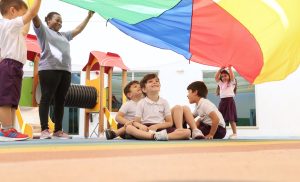
Uncover expert insights, parent reviews, and essential details about leading EYFS nurseries in Dubai and beyond. Scroll down to find out more about our top picks that guarantee a stimulating educational experience for your child!
1. Personal, Social, and Emotional Development
Encouraging self-confidence and independence is a cornerstone of the Early Years Foundation Stage (EYFS) curriculum. Children are guided to make choices independently, fostering a sense of autonomy.
Positive relationships with peers and adults play a vital role in emotional development. Through interactions in nurseries or preschools, children learn how to communicate effectively, share experiences, and collaborate with others.
Developing empathy is crucial for understanding others’ feelings. By engaging in activities that promote empathy within educational settings aligned with EYFS principles, children enhance their social skills and build strong foundations for future relationships.
Incorporating early learning goals related to personal, social, and emotional development ensures that children reach key milestones during their formative years. Educators focus on nurturing behaviors that lead to positive outcomes both at school and beyond.
2. Communication and Language
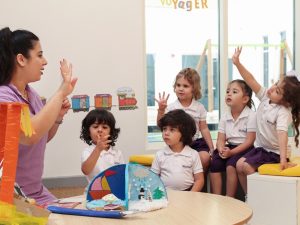
- Vocabulary Growth: Activities like storytelling, singing, and conversations expand children’s vocabulary.
- Effective Communication: Through listening activities and speaking exercises, young learners develop crucial communication skills.
- Early Literacy Skills: Introduction to reading through picture books and basic writing practice sets the foundation for future academic success.
These approaches in the reception year not only aid in linguistic proficiency but also nurture social interactions among children as they learn to express themselves effectively. Furthermore, creating a language-rich environment supports cognitive development by stimulating critical thinking processes at an early age.
3. Physical Development
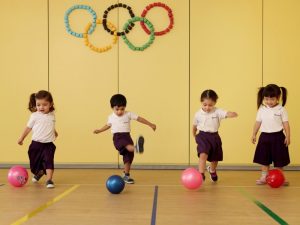
Enhancing fine motor skills at a young age sets the stage for future writing and drawing abilities. Activities such as coloring, cutting with scissors, and using building blocks help refine these essential skills.
Promoting healthy habits from an early age instills lifelong practices that contribute to physical well-being. Teaching children about the importance of regular exercise, proper nutrition, and good hygiene establishes a foundation for a healthy lifestyle.
Incorporating activities that focus on physical development not only aids in the progress of motor skills but also supports cognitive growth in young learners. By engaging in movement-based tasks regularly, children learn to control their bodies effectively while developing spatial awareness.
Encouraging physical activity at an early stage can lead to improved concentration levels among children during learning sessions. Research shows that regular exercise positively impacts brain function by enhancing memory retention and cognitive abilities.
4. Literacy
- Introduces phonics and letter recognition to lay a strong foundation for reading skills.
- Cultivates a love for reading through engaging storytelling sessions, fostering a positive attitude towards books.
- Develops early writing skills by encouraging mark-making activities that enhance fine motor skills.
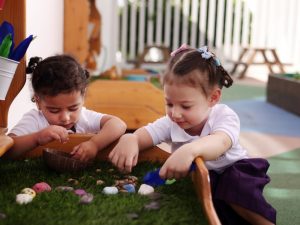
Storytime sessions not only entertain but also serve as crucial tools for building vocabulary and comprehension abilities among young learners. By immersing children in diverse stories and narratives, nurseries help them develop their imagination while expanding their knowledge base.
Furthermore, mark-making activities like drawing shapes or scribbling with crayons aid in strengthening hand-eye coordination and muscle control necessary for later writing tasks. These exercises promote creativity while simultaneously preparing children to transition into forming letters and words confidently.
5. Mathematics
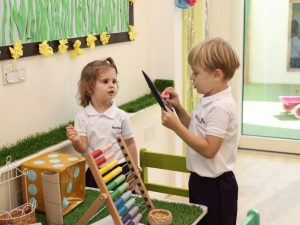
- Number Recognition and Counting: The introduction to numbers at an early age helps children develop essential numeracy skills.
- Basic Mathematical Concepts: Exploring shapes and patterns not only enhances cognitive abilities but also fosters spatial awareness.
- Problem-Solving Skills: By engaging with mathematical concepts, children learn to analyze situations, think critically, and develop problem-solving strategies.
Incorporating mathematics into the EYFS curriculum equips young learners with foundational skills that are vital for their academic journey. Through interactive activities and hands-on experiences, children can grasp abstract mathematical concepts more effectively. This approach not only makes learning enjoyable but also instills a love for exploring numerical ideas from an early age.
6. Understanding the World
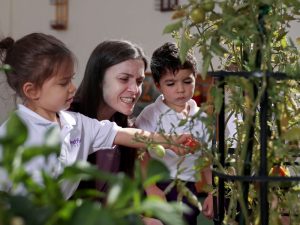
Introducing cultural diversity helps children appreciate differences and similarities among people worldwide. This exposure fosters respect for various traditions, languages, and customs from an early age.
Developing an understanding of technology equips children with essential skills for the modern world. Nurseries provide opportunities for hands-on experiences with age-appropriate devices to enhance digital literacy.
By incorporating these key aims into the curriculum, nurseries lay a strong foundation for children’s knowledge about the world around them. These experiences help build a well-rounded perspective on global issues and technological advancements.
Incorporating activities that focus on understanding different environments, cultures, and technologies enriches children’s learning experiences during their formative years.
7. Expressive Arts and Design
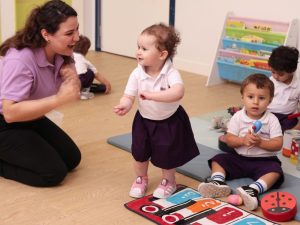
In nurseries following the EYFS guidelines in Dubai, children are provided with various materials and resources to engage in imaginative play. This hands-on approach fosters self-expression and allows children to explore their artistic abilities freely.
By engaging in expressive arts and design activities, young learners develop an appreciation for different forms of art from a very early age. This exposure helps them understand diverse cultural expressions through creative mediums like painting, sculpting, dancing, or singing.
The prime areas of learning within the EYFS framework emphasize these specific areas as they lay the foundation for a child’s holistic development. Nurturing creativity at this stage can have long-term benefits on cognitive development and emotional intelligence among children.
8. Play-Based Learning Approach
- Play is central to the learning environment.
- Encourages children’s curiosity and interests through play.
- Enhances engagement with hands-on experiences.

Practitioners create an environment where children are encouraged to explore, experiment, and discover through play. This approach aligns with research showing that playful learning enhances retention and understanding of the material taught compared to traditional methods.
Schools implementing this approach often witness increased motivation levels among students due to the interactive nature of play-based learning. Moreover, it allows educators to tailor activities based on individual needs and interests, leading to a more personalized educational experience for each child.
9. Continuous Assessment and Observation
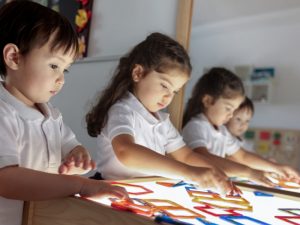
Observations serve as valuable tools for teachers to gain insights into how children learn, what interests them, and where they may need additional support. This information is then used to create personalized learning experiences that cater to the unique requirements of each child.
Identifying individual needs through continuous assessment allows educators to provide targeted support, ensuring that every child receives the necessary guidance and resources for their optimal growth and development. By recognizing strengths and areas for improvement early on, teachers can implement interventions promptly, fostering a positive learning environment for all children.
10. Parental Engagement and Partnership
Engaging parents in their child’s educational journey is a crucial aspect of the EYFS curriculum in Dubai nurseries. It fosters a sense of collaboration between parents and educators, creating a supportive environment for children’s growth.
- Involves Parents: By involving parents, nurseries create opportunities for them to actively participate in their child’s learning experiences.
- Open Communication: Establishing open lines of communication ensures that parents are informed about their child’s progress, challenges, and achievements.
- Supportive Collaborations: Through partnerships with parents, educators can provide holistic support to children by aligning efforts both at home and in the nursery.
Parental engagement not only benefits the child but also enhances the overall effectiveness of early childhood education programs. When families are involved in their child’s learning process, it leads to improved academic outcomes and social-emotional development.
Final Remarks
The Early Years Foundation Stage (EYFS) curriculum plays a pivotal role in nurturing children’s holistic development. By focusing on key areas like personal, social, and emotional development, communication and language skills, and fostering parental engagement, EYFS nurseries and preschools in Dubai and the UAE create a supportive environment for young learners. Incorporating play-based learning approaches and continuous assessment methods further enhance the educational experience, ensuring that children receive tailored support to reach their full potential. Understanding the world, literacy, mathematics, and expressive arts and design are integral components that shape a well-rounded educational journey for these young minds.
Reflecting on the significant impact of EYFS on early childhood education, parents and educators are encouraged to explore these foundational principles further to provide enriching experiences for children. Embracing the EYFS framework can lead to enhanced learning outcomes and better preparation for future academic pursuits.
